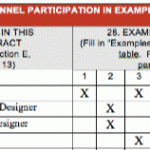I have a question for you.
I never understood people who hesitate to share info on their contacts with their firm. The way I see it is there is nobody in my address book whose address and phone number can’t be bought.
With sites like Jigsaw.com, association directories, and businesses who sell lists of industry contacts, the days when contact info was valuable are over.
The value isn’t in my rolodex. The value is when the receptionist says, “Matt Handal is one the phone,” and the contact says, “send him through.” Or when I send them an email and they actually read it. It doesn’t get marked as spam. Nobody can steal that from me.
I couldn’t simply steal Tim Klabunde’s Outlook file and turn that into a couple million dollars for my firm.
But the idea of sharing contact info with an employer scares the pants off people. Some people would rather quit than give up their Rolodex. Others would have you pry it from their cold dead hands.
Is there something I am missing? Should we cling tight to our Rolodex?
Leave a comment below! We’d love to hear your thoughts!






Interesting topic. I see relationships as a form of currency and you hit it on the head when you stated the value comes from the relationship NOT the email address or phone number.
In my line of work, these relationships are part of the collateral that I bring (I work in business development). I think that in a true win-win atmosphere, all employees would want to leverage their relationships to help their company (and them) succeed. However, it’s a two-way street and the employer must always realize that their actions can reflect poorly on the employee who helped facilitate that introduction.
Just because you are an employer doesn’t mean you shouldn’t follow the standard rules of ettiquette regarding employee contacts as you would for standard clients/leads. Sometimes people think “oh, this is Joe’s friend, so I have a leg up” and then act ridiculously. I’ve been on the end of having to apologize for an employer in the past and it can really ruin releationships.
Curious what others think.
Janki,
Thank you for joining the discussion. I think we are on the same page. I agree that firms have to think win-win and keep in mind that relationships are between two individuals. They are not exactly transferrable. You can get an introduction, but you have to build your own relationship with each contact.
Thank you again!
Recently I starting working with a firm as the Director of Business Development and Marketing. Right off the bat they required that I download all of my previous acquired contacts into their database. Then they presented a contract of non-compete. The contract stated that I would have to wait for 5 years before I can work for a competing company and there was also a clause stating that any and all contacts in the database is now their property. They claimed that a previous employee was fired because they believed he was doing business behind their backs. They were acting out of mistrust.
I agree with the comments made above. No one can buy the relationship you have built over the years, but what happens when the company takes possession of the contacts you have built over many years and the contract keeps you from working with them if you no longer work with the company?
I strongly believe in sharing my contacts and believe in team work. I am not an expert in all of the services that this firm provides and in some cases I need an expert to close the deal. I am also very confident in the relationship that I have built with my clients.
The bottom line is how do I prevent losing my clients to a firm if things were to go wrong? Thank you for posting this question. Your feedback is appreciated.
Donna,
I think the issue you are dealing with isn’t one of sharing contacts, its about the non-compete contract. That is a legal issue. I certainly wouldn’t sign a non-compete contract unless:
In a profession where staying at one firm for five years is a “long time,” signing a non-compete seems like a decision not to be taken lightly.
I’m sure each state has different laws regarding non-compete contracts. If you have already signed a non-compete, it may not be enforceable in your state. So, you really have to speak to a qualified attorney in your state.
Matt- First off, if anyone could turn someone else’s contacts into a couple of million dollars it would be you.
Now to the point at hand, I agree that there is simply no point in hoarding contacts if you are in a company that you trust and that trusts you. You will win more work if you can work as a team instead of as an individual. Where I have often seen people hoarding their contacts is when there are personal incentives to the person that brings the work in the door (commission or bonuses typically). Personal incentives create a culture of competition, and typically competitors don’t share their playbooks during the game. I think this is a more of a question of corporate culture and your individual personality. In the long-term however, firms that encourage teamwork typically out-perform and out-sell firms that encourage competition. Tim Klabunde
I’ve only known the world of incentives. But I do agree, it is more effective to approach business development as a team.
Thank you for chiming in.